(完整word版)一般疑问句讲解及练习题
一般疑问句讲解及专项练习

练习在阅读理解中找出并理解一般疑问句,提高阅读理 解能力。
04 一般疑问句常见错误及纠 正方法
主谓不一致错误
错误示例
Does he like playing football and swimming?
纠正方法
当主语为第三人称单数时,助动 词does应与主语保持一致,但 like应为原形。正确句子为: Does he like playing football and swimming? (他喜欢踢足球
助动词do/does的误用
当句子中有实义动词时,需要使用 助动词do或does来构成一般疑问 句,注意根据主语人称和数选择正 确的助动词。
否定回答中缩写形式的误用
在否定回答中,常使用缩写形式, 如aren't、isn't、don't等,注意 缩写形式的正确书写。
肯定回答中人称代词的误用
在肯定回答中,应使用相应的人称 代词以避免重复,如Are you a student? Yes, I am.
VS
与特殊疑问句关系
一般疑问句与特殊疑问句都是疑问句的一 种,但它们在结构和用法上有所不同。特 殊疑问句需要用特殊疑问词来引导,而一 般疑问句则不需要。此外,特殊疑问句的 回答通常比较具体,而一般疑问句的回答 则比较简单,通常用Yes或No来回答。
02 一般疑问句分类及用法
Be动词引导疑问句
Be动词置于句首
在省略句中构成一般疑问句
在省略句中,需要根据上下文语 境来判断省略的成分,并正确构 成一般疑问句。
THANKS FOR WATCHING
感谢您的观看
否定词使用不当
错误示例
Isn't he comes from China?
(完整word版)英语一般疑问句和回答
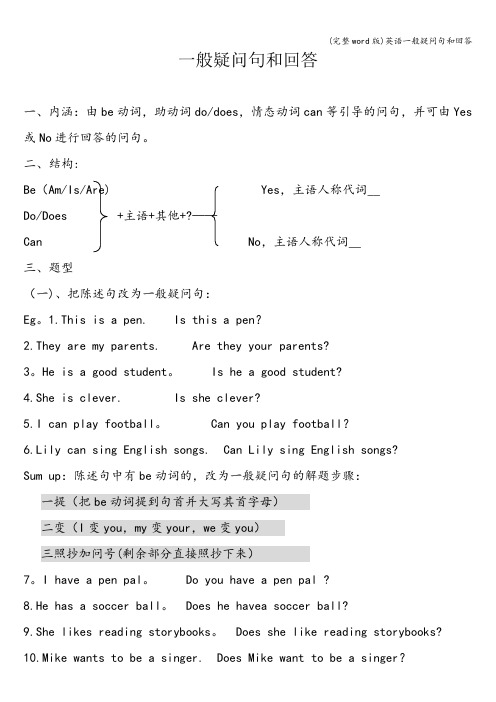
一般疑问句和回答一、内涵:由be动词,助动词do/does,情态动词can等引导的问句,并可由Yes 或No进行回答的问句。
二、结构:Be(Am/Is/Are) Yes,主语人称代词__Do/Does +主语+其他+?——Can No,主语人称代词__三、题型(一)、把陈述句改为一般疑问句:Eg。
1.This is a pen. Is this a pen?2.They are my parents. Are they your parents?3。
He is a good student。
Is he a good student?4.She is clever. Is she clever?5.I can play football。
Can you play football?6.Lily can sing English songs. Can Lily sing English songs?Sum up:陈述句中有be动词的,改为一般疑问句的解题步骤:一提(把be动词提到句首并大写其首字母)二变(I变you,my变your,we变you)三照抄加问号(剩余部分直接照抄下来)7。
I have a pen pal。
Do you have a pen pal ?8.He has a soccer ball。
Does he havea soccer ball?9.She likes reading storybooks。
Does she like reading storybooks?10.Mike wants to be a singer. Does Mike want to be a singer?Sum up:陈述句中有实意动词的(没有be/can),改为一般疑问句的解题步骤:一加(在句首加助动词Do/Does)二变(I变you,my变your,we变you)三照抄加问号(剩余部分直接照抄下来!实意动词要变回原型形式)练习:把下列句子改为一般疑问句.1。
一般疑问句和特殊疑问句附练习题及答案

中小学英语一般疑问句和特殊疑问句详解(附练习题及答案)一、一般疑问句1定义:用Yes或No作答的疑问句叫一般疑问句。
2、特点:1>以be 动词am/is/are、助动词do/does、情态动词can/could/may、there be(即there is /are)开头; 例:Is your father a teacher?/ Does Tom like apples? /Can Jenny speak English? /Is there a book on the desk?2>往往读升调3、陈述句变成一般疑问句的方法:1>看陈述句中有没有be动词(am、is are、was、were)或情态动词(can/could/may),如果有,将其提到句首,句末打上问号即可。
例:It is rainy now Is it rainy now?Tom's father can play the piano. Can Tom's father play the piano?There is a book on the desk. Is there a book on the desk?2>如果句中没有be动词或情态动词,句首加do的相应形式(do、does、did),且原句的谓语动词要变回原形。
1.They go to school by bike. Do they go to school by bike?2.Bill gets up at 6:30 every day. Does bill gets up at 6:30 every day?3.The students saw a film yesterday. Did the students see a film yesterday?注:1)如果陈述句中有第一人称,则变问句时要变为第二人称。
I usually have lunch at school. Do you usually have lunch at school?2)如果陈述句中有some,则变问句时往往要变成any 。
一般疑问句讲解及练习题
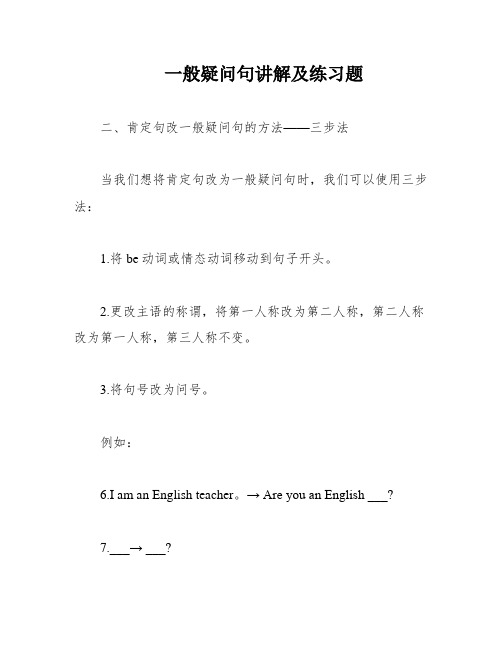
一般疑问句讲解及练习题二、肯定句改一般疑问句的方法——三步法当我们想将肯定句改为一般疑问句时,我们可以使用三步法:1.将be动词或情态动词移动到句子开头。
2.更改主语的称谓,将第一人称改为第二人称,第二人称改为第一人称,第三人称不变。
3.将句号改为问号。
例如:6.I am an English teacher。
→ Are you an English ___?7.___→ ___?练:请将以下句子改为一般疑问句:1.I am ___.2.Mike is a student.3.They are in the zoo.4.There are some flowers in the vase.5.This is my sister.6.___.7.There is an ostrich in the zoo.8.It is a beautiful park.9.It is a big map.10.You are a singer.1.Is it a lovely dog?2.Is she a lovely girl?3.Is he your father?4.Are they Lily's cousins?5.Are we classmates?6.Am I a doctor?7.Is there a bird in the tree?8.Are there many stars in the sky?9.Are they good friends?10.Are there many books on the shelf?___: add "do" or "does" at the beginning of the sentence。
change the verb to its base form。
and change the subject if necessary。
一般疑问句讲解及练习

一般疑问句在英语学习中,一般疑问句的转换及回答是经常碰到的问题,现在我们就来探讨一下一般疑问句的问题。
一什么是一般疑问句以be动词(am is are),助动词(do does have),情态动词(can)开头的句子,用Yes或No 作答。
读升调!二陈述句变一般疑问句遵循1找2接1找看句中有没有be动词(am is are),助动词(do does have has),情态动词(can),如果有,直接将其放句首,句末打上问号。
Eg: He is three years old . (变一般疑问句)Is he three years old ?They are good friends .(变一般疑问句)Are they good friends ?She can swim and draw.(变一般疑问句)Can she swim and draw ?2借如果句中有没有be动词(am is are),助动词(do does have has),情态动词(can),则根据谓语动词的形式借助do 或does放句首。
具体方法:如果谓语动词是原型,则借助do 放句首;如果谓语动词是第三人称单数形式,则借助does 放句首,原句的谓语动词要变回原型。
Eg:They go to school by bike .Do they go to school by bike ?He goes to school by bike .Does he go to school by bike ?3 如果句中有实意动词have/ has ,且表示有时,可以“借”也可以“找”,即可以借do/does放句首,也可以直接把have/ has放句首。
Eg:They have ten apples .1)Do they have ten apples ? Yes , they do . No , they don’t2)Have they ten apples ? Yes , they have .No , they haven’t.陈述句变一般疑问句注意事项:1如果陈述句中有第一人称,变一般疑问句时一定要变成第二人称。
(完整word版)七年级英语一般疑问句练习题
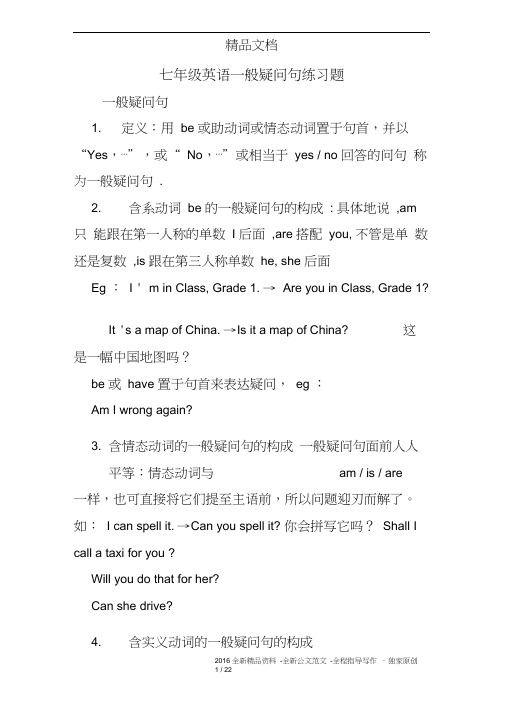
精品文档七年级英语一般疑问句练习题一般疑问句1. 定义:用be 或助动词或情态动词置于句首,并以“Yes,⋯”,或“ No,⋯”或相当于yes / no 回答的问句称为一般疑问句.2. 含系动词be 的一般疑问句的构成: 具体地说,am 只能跟在第一人称的单数I 后面,are 搭配you, 不管是单数还是复数,is 跟在第三人称单数he, she 后面Eg :I ' m in Class, Grade 1. → Are you in Class, Grade 1?It 's a map of China. →Is it a map of China? 这是一幅中国地图吗?be 或have 置于句首来表达疑问,eg :Am I wrong again?3. 含情态动词的一般疑问句的构成一般疑问句面前人人平等:情态动词与am / is / are一样,也可直接将它们提至主语前,所以问题迎刃而解了。
如:I can spell it. →Can you spell it? 你会拼写它吗?Shall I call a taxi for you ?Will you do that for her?Can she drive?4. 含实义动词的一般疑问句的构成含实义动词的一般疑问句的构成稍微有点讲究,要在句首加do;如逢主语为第三人称单数,谓语动词为一般现在时单数第三人称形式“v- s”时,用does, 并要将谓语动词变回原形;有时陈述句中的some还要变作any 等。
如:She lives in Beijing. →Does she live i n Beijing?I like English. →Do you like English?There are some books on my desk. →Are there any books on your desk?5. 般疑问句的应答用yes / no 回答,并怎么问怎么答,简略回答时要注意缩写和采用相应的人称代词以避免重复:即” Yes,主语+情态动词或am / is / are 或do / does. ”表示肯定;” No,主语+情态动词或am / is / are 或者do / does not. ”表示否定。
一般疑问句详解加练习答案

1、一般疑问句概述一般疑问句(general questions),也可称为“yes/no” questions(是否型问句),因为它一般是由yes或no回答的,如:你是……吗?”,“你做……了吗?”一般读升调(↑)Are you Lucy ? Yes I am./No I'm not.Can you swim to the other side?—Yes, I can. —No,I can’t.Have you locked the door?—Yes,I have. —No,I haven’t.2一般疑问句的结构(1)基本的结构为:be/助动词/情态动词+主语+谓语/表语+(其他),句子要读升调,如:Are they your friends?Does he go to school on foot?Will you be free tonight?Can you play basketball?# 陈述句:He can drive a car. 一般疑问句: Can he drive a car?# 加助动词do/does,第三人称单数用does,其他人称用do。
其句型为:Do/Does + 主语 + have...?例如上句可变为: Does Tommy have a computer? Does Amy speak English? 请问学员xxx 陈述句是什么?(2)陈述句亦可用作一般疑问句,多用在非正式文体中,句末有问号,用升调,如:Somebody is with you?He didn’t finish the wor k?You are fresh from America,I suppose?我猜,你刚从美国回来吧?3、一般疑问句的答语(1)一般疑问句一般由yes或no来回答,如:—Are you tired?—Yes,I am. —No, I’m not.—Does she do the cleaning?—Yes ,she does. —No,she doesn’t.(2)回答一般疑问句除了用yes或no外,也可用certainly,probably,perhaps,of course,all right,with pleasure等代替yes,用never,not at all等代替no,如:—Can you help me?—Certainly.—Could you please make less noise?—All right,sir.—Have you been there?—Never.Are they in town now?I think so. May I sit here?Certainly.Does he like soccer?Sorry I don't know.4、一般疑问句的否定式(1)一般疑问句的否定式,一般结构为系动词/助动词/情态动词+not+主语;也可为系动词/助动词/情态动词+主语+not,如:Do you not/Don’t you believe me? 你不相信我?Is it not / Isn’t it a lovely day? 天气难道不好吗?Are you not / Aren’t you coming?你不来吗?W ill you not /Won’t you sit down? 你不坐会儿吗?Is he not / Isn’t he a doctor? 他不是医生吗?Does Helen not /Doesn’t Helen like chocolate? 海伦不喜欢巧克力吗?Will he not /Won’t he go with you?他不和你一块儿去吗?(2)否定疑问句并不单纯表示提问,它常常带有感情色彩。
一般疑问句讲解及练习题(汇编)

变一般疑问句二、肯定句改一般疑问句的方法——三步法1、含be动词或情态动词的句子秘诀:一调二改三问号一调:即把句中的be或情态动词调到主语前;二改:改换主语称谓,即将句中的主语I\my \mines\we\our\ours等第一人称分别改为相应的第二人称you\your\ yours等;三问号:句末的句号改为问号。
Eg:6. I am an English teacher.→Are you an English teacher? Eg:7. We can speak English fluently.→Can you speak English fluently?做题步骤:(句子中是be动词,即是am, is, are)1、把be动词(am, is, are)或情态动词放在句首,剩下的照抄。
2、人称变化:一变二、二变一、三不变。
(第一人称变成第二人称、第二人称变成第一人称、第三人称不变化。
)I ---- You my --- your we --- you3、some 改成any4、句点改成问号。
把下列句子变成一般疑问句1.I am listening to music.2.Mike is a student.3.They are in the zoo.4.There are some flowers in the vase.5.This is my sister.6.We are sweeping the floor.7.There is an ostrich in the zoo.8.It is a beautiful park.9.It is a big map.10. You are a singer.练习:将下列句子改成一般疑问句1.It is a lovely dog.2.She is lovely girl.3.He is my father.4.They are Lily’s cousins.5.We are classmates.6.I am a doctor.7.There is a bird in the tree.8.There are many stars in the sky.9.They are good friends.10.There are many books on the shelf.变一般疑问句(二)2、含行为动词(或称为实义动词)的句子秘诀:一加二改三问号一加:即在句首加助动词Do或Does;二改:1、把谓语动词改为原形;2.改换主语称谓三问号:句末的句号改为问号。
完整word版,一般疑问句讲解(含练习和答案)

一.将陈说句变为一般疑问句。
1.看句中有没有 be 动词( am、is 、 are 、 was、 were )、助动词( do、does、did 、have、 had )或神态动词( can、must、will 、may等),假如有,将其提到句首,句末打上问号可。
例:(1)—It was rainy yesterday.—Was it rainy yesterday?(2) —Tom's father can play the piano.—Can Tom's father play the piano?2.假如句中没有be 动词、助动词或神态动词,则依据谓语动词的形式借助do 的相应形式放在句首。
详细方法是:假如谓语动词是原形,则借 do;假如谓语动词是一般此刻时第三人称单数形式,则借 does;假如谓语动词是过去式,则借 did. 需要注意的是,借 does 或 did 后,原句的谓语动词要变回原形。
例 :(1)—Tom likes listening to music. — Does Tom like listening to music?(2)—Bill gets up at 6:30 every day. —Does Bill get up at 6:30 every day?二、一般疑问句的回答一般疑问句常常采纳简洁回答,共由三部分构成,对这三部分确实定能够归纳例下:1.第一部分:不是 Yes 就是 No。
(有时依据语气的不一样, Yes 可由 Sure, Certainly(自然),Of course; No 可用 never ,not at all等取代)例:(1) —Can you help me ?—Certainly.(自然)。
(2)—Have you been there ?—Never.( 素来没有。
)2.第二部分:问谁答谁。
即答语中的主语须与问句的主语一致(但一定用主格代词)。
一般疑问句详解加练习答案

1、一般疑问句概述一般疑问句(general questions),也可称为“yes/no” questions(是否型问句),因为它一般是由yes或no回答的,如:你是……吗”,“你做……了吗”一般读升调(↑)Are you Lucy Yes I am./ No I'm not.Can you swim to the other side —Yes, I can. —No,I can’t. Have you locked the door —Yes,I have. —No,I haven’t.2一般疑问句的结构(1)基本的结构为:be/助动词/情态动词+主语+谓语/表语+(其他),句子要读升调,如:Are they your friends Does he go to school on footWill you be free tonight Can you play basketball# 陈述句:He can drive a car. 一般疑问句: Can he drive a ca r# 加助动词do/does,第三人称单数用does,其他人称用do。
其句型为:Do/Doe s + 主语+ have...例如上句可变为: Does Tommy have a computer Does Amy speak English 请问学员xxx 陈述句是什么?(2)陈述句亦可用作一般疑问句,多用在非正式文体中,句末有问号,用升调,如:Somebody is with you He didn’t finish the workYou are fresh from America,I suppose 我猜,你刚从美国回来吧3、一般疑问句的答语(1)一般疑问句一般由yes或no来回答,如:—Are you tired —Yes,I am. —No, I’m not.—Does she do the cleaning—Yes ,she does. —No,she doesn’t.(2)回答一般疑问句除了用yes或no外,也可用certainly,probably,perh aps,of course,all right,with pleasure等代替yes,用never,not at a ll等代替no,如:—Can you help me—Certainly.—Could you please make less noise —All right,sir.—Have you been there —Never.Are they in town now I think so. May I sit hereCertainly.Does he like soccer Sorry I don't know.4、一般疑问句的否定式(1)一般疑问句的否定式,一般结构为系动词/助动词/情态动词+not+主语;也可为系动词/助动词/情态动词+主语+not,如:Do you not/Don’t you believe me 你不相信我?Is it not / Isn’t it a lovely day 天气难道不好吗Are you not / Aren’t you coming你不来吗Will you not /Won’t you sit d own 你不坐会儿吗Is he not / Isn’t he a doctor 他不是医生吗?Does Helen not /Doesn’t Helen like chocolate 海伦不喜欢巧克力吗?Will he not /Won’t he go with you他不和你一块儿去吗?(2)否定疑问句并不单纯表示提问,它常常带有感情色彩。
一般疑问句和否定句讲解和练习题
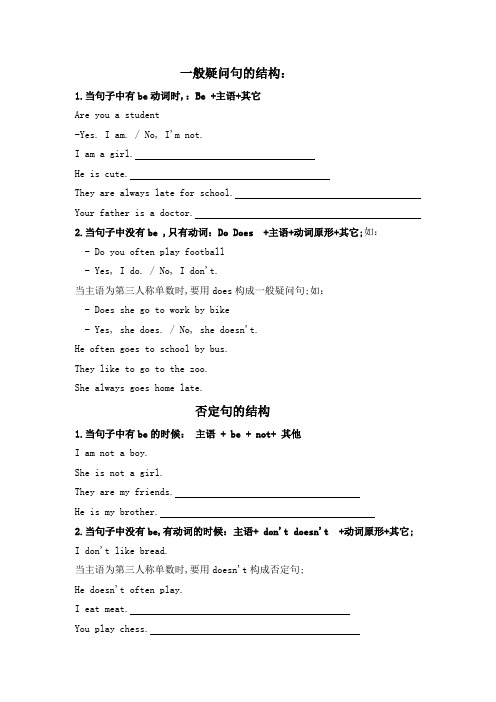
一般疑问句的结构:1.当句子中有be动词时,:Be +主语+其它Are you a student-Yes. I am. / No, I'm not.I am a girl.He is cute.They are always late for school. Your father is a doctor.2.当句子中没有be ,只有动词:Do Does +主语+动词原形+其它;如:- Do you often play football- Yes, I do. / No, I don't.当主语为第三人称单数时,要用does构成一般疑问句;如:- Does she go to work by bike- Yes, she does. / No, she doesn't.He often goes to school by bus.They like to go to the zoo.She always goes home late.否定句的结构1.当句子中有be的时候:主语 + be + not+ 其他I am not a boy.She is not a girl.They are my friends.He is my brother.2.当句子中没有be,有动词的时候:主语+ don't doesn't +动词原形+其它;I don't like bread.当主语为第三人称单数时,要用doesn't构成否定句;He doesn't often play.I eat meat.You play chess.She always does the housework on Sunday.The dog plays with its tail all the day.一、用所给动词的一般现在时填空;1. We often play in the playgrounnd.2 you brush your teeth every morning3. What do he usually do after school4. Danny study English, Chinese, Maths, Science, and Art an school.5. Mike sometimes go to the park with his sister.6. At eight at night, she watch TV with his family.7. Mike read English every day8. How many lessons your classmate have on Monday9. What time his mother do the housework二、按要求改写句子;1Do you often play football after school 改为肯定句2I have some books. 改为否定句3Gao Shan’s sister likes playing table tennis. 改为否定句4She lives in a small town near New York. 改为一般疑问句5I watch TV every day. 改为一般疑问句6We have four lessons. 改为否定句7Nancy doesn’t run fast. 改为肯定句三、单项选择;1. you have a bookA. DoB. AreC. IsD. Have2. They on a farm.A. workingB. is workC. workD. is worked3. Does Peter like to watch TV .A. Yes, he likeB. No, he doesn’tC. Yes, he’d likeD. No, he likes4. She doesn’t her homework in the afternoon.A. doingB. to doC. doesD. do5. Where’s my camera I it.A.am not findingB. am not seeingC. can’t findD. can’t lookat6. you usually late for school No, .A. Do, I amB. Does, notC. Are, I’m notD. Are, I aren’t7. she home at six every dayA. Is, leaveB. Does, leaveC. Is, leavesD. Does, left8. Mr. Yang English this term.A. teaches ourB. teaches usC. teachs usD. teach ourI have 3 new teachers. They are my English teacher, my teacher and my Chinese teacher. Miss zhao is pretty and active. She's a universitystudent. She's our English teacher. My teacher is Mr. Chen. He's tall and strong, and he's strict, too. Miss Sun is my Chinese teacher. She's quiet. She has long hair and big eyes.1. I have new teachers. A. twoB. threeC. four2. Miss Zhao is myteacher. A. EnglishB. ChineseC. PE3. Mr. Chen is . A. tall B. strong C. tall and strong4. Is my teacher strictA. Yes, she is B. Yes, he is C. No, he isn't5. Miss Sun is . A. quiet B. active C. strict。
一般疑问句和特殊疑问句(附练习题及答案

中小学英语一般疑问句和特殊疑问句详解 (附练习题及答案)一、一般疑问句1、定义: 用Yes或No作答的疑问句叫一般疑问句。
作答的疑问句叫一般疑问句。
2、特点:1> 以be动词am/is/are、助动词do/does、情态动词can/could/may、there be(即there is /are)开头;例:Is your father a teacher?/ Does Tom like apples? /Can Jenny speak English? /Is there a book on the desk?2> 往往读升调往往读升调3、陈述句变成一般疑问句的方法:1> 看陈述句中有没有be动词(am、is、are、was、were)或情态动词(can/could/may),如果有,将其提到句首,句末打上问号即可。
例: It is rainy now→Is it rainy now?Tom's father can play the piano.→ Can Tom's father play the piano?There is a book on the desk.→ Is there a book on the desk?2>如果句中没有be动词或情态动词,句首加do的相应形式(do、does、did),且原句的谓语动词要变回原形。
1. They go to school by bike. → Do they go to school by bike?2. Bill gets up at 6:30 every day. → Does bill gets up at 6:30 every day?3. The students saw a film yesterday. → Did the students see a film yesterday?则变问句时要变为第二人称。
(完整版)一般疑问句及回答练习题

一般疑问句及回答练习将下列句子改成一般疑问句:并做肯定回答和否定回答1。
It is a lovely dog.________________________________________ Yes, ___________ No, ____________2。
She is lovely girl.________________________________________Yes, ___________ No, ____________3。
He is my father._________________________________________Yes, ___________ No, ____________4。
They are Lily's cousins。
___________________________________ Yes, ___________ No, ____________5. We are classmates. ______________________________________ Yes, ___________ No, ____________6. I am a doctor。
________________________________________ Yes, ___________ No, ____________7. There is a bird in the tree. ________________________________ Yes, ___________ No, ____________8. There are many stars in the sky. ____________________________ Yes, ___________ No, ____________9。
They are good friends. ____________________________________ Yes, ___________ No, ____________10。
一般疑问句讲解含练习和答案
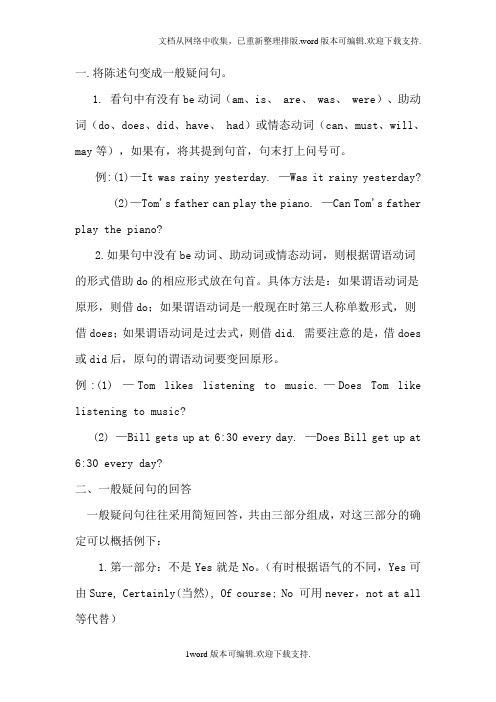
一.将陈述句变成一般疑问句。
1. 看句中有没有be动词(am、is、 are、 was、 were)、助动词(do、does、did、have、 had)或情态动词(can、must、will、may等),如果有,将其提到句首,句末打上问号可。
例:(1)—It was rainy yesterday. —Was it rainy yesterday?(2)—Tom's father can play the piano. —Can Tom's father play the piano?2.如果句中没有be动词、助动词或情态动词,则根据谓语动词的形式借助do的相应形式放在句首。
具体方法是:如果谓语动词是原形,则借do;如果谓语动词是一般现在时第三人称单数形式,则借does;如果谓语动词是过去式,则借did. 需要注意的是,借does 或did后,原句的谓语动词要变回原形。
例:(1) —Tom likes listening to music.—Does Tom like listening to music?(2) —Bill gets up at 6:30 every day. —Does Bill get up at 6:30 every day?二、一般疑问句的回答一般疑问句往往采用简短回答,共由三部分组成,对这三部分的确定可以概括例下:1.第一部分:不是Yes就是No。
(有时根据语气的不同,Yes可由Sure, Certainly(当然), Of course; No 可用never,not at all 等代替)例:(1)—Can you help me?—Certainly.(当然)。
(2)—Have you been there?—Never.( 从来没有。
)2.第二部分:问谁答谁。
即答语中的主语须与问句的主语一致(但必须用主格代词)。
例:(1)—Does she clean her room every day? —Yes, she does.(2)—Is Anna′s father a doctor? —No,he isn′t.(如果主语是 this that,回答时用 it 代替,如果问句中主语these, those,回答时用 they 代替。
(完整word版)一般疑问句讲解及练习

一般疑问句在英语学习中,一般疑问句的转换及回答是经常碰到的问题,现在我们就来探讨一下一般疑问句的问题。
一什么是一般疑问句以be动词(am is are),助动词(do does have),情态动词(can)开头的句子,用Yes 或No 作答。
读升调!二陈述句变一般疑问句遵循1找2接1找看句中有没有be动词(am is are),助动词(do does have has),情态动词(can),如果有,直接将其放句首,句末打上问号。
Eg: He is three years old 。
(变一般疑问句)Is he three years old ?They are good friends .(变一般疑问句)Are they good friends ?She can swim and draw。
(变一般疑问句)Can she swim and draw ?2借如果句中有没有be动词(am is are),助动词(do does have has),情态动词(can),则根据谓语动词的形式借助do 或does放句首。
具体方法:如果谓语动词是原型,则借助do 放句首;如果谓语动词是第三人称单数形式,则借助does 放句首,原句的谓语动词要变回原型。
Eg:They go to school by bike .Do they go to school by bike ?He goes to school by bike .Does he go to school by bike ?3 如果句中有实意动词have/ has ,且表示有时,可以“借”也可以“找”,即可以借do/does放句首,也可以直接把have/ has放句首。
Eg:They have ten apples 。
1)Do they have ten apples ? Yes , they do . No , they don’t 2)Have they ten apples ? Yes , they have .No , they haven’t.陈述句变一般疑问句注意事项:1如果陈述句中有第一人称,变一般疑问句时一定要变成第二人称。
(完整版)小学英语一般疑问句和特殊疑问句(附练习题)

一、一般疑问句1、定义 : 用 Yes 或 No 作答的疑问句叫一般疑问句。
2、特色:1、以 be 动词、助动词或神态动词开头;例:Is your father a teacher? Does Tom like apples? Can Jenny speak English? 2、常常读升调3、陈说句变为一般疑问句的方法:1> 看陈说句中有没有be 动词(am、is、 are、 was、 were)或神态动词( can),假如有,将其提到句首,句末打上问号即可。
例: It was rainy yesterday.→Was it rainy yesterday?Tom's father can play the piano.→Can Tom's father play the piano?2>假如句中没有 be 动词或神态动词,句首加do 的相应形式( do、does、did),且原句的谓语动词要变回原形。
1.They go to school by bike.→ Do they go to school by bike?2.Bill gets up at 6:30 every day.→ Does bill gets up at 6:30 every day?3.The students saw a film yesterday.→ Did the students see a film yesterday?注: 1.假如陈说句中有第一人称,则变问句时要变为第二人称。
I usually have lunch at school.→ Do you usually have lunch at school?2.假如陈说句中有some, 则变问句时常常要变为any 。
There is some water on the playground. → Is there any water on the playground4、一般疑问句的回答。
一般疑问句和特殊疑问句(附练习题及答案

⼀般疑问句和特殊疑问句(附练习题及答案中⼩学英语⼀般疑问句和特殊疑问句详解(附练习题及答案)⼀、⼀般疑问句1、定义:⽤Yes或No作答的疑问句叫⼀般疑问句。
2、特点:1> 以be动词am/is/are、助动词do/does、情态动词can/could/may、there be(即there is /are)开头;例:Is your father a teacher?/ Does Tom like apples? /Can Jenny speak English? /Is there a book on the desk?2> 往往读升调3、陈述句变成⼀般疑问句的⽅法:1> 看陈述句中有没有be动词(am、is、are、was、were)或情态动词(can/could/may),如果有,将其提到句⾸,句末打上问号即可。
例: It is rainy now→Is it rainy now?Tom's father can play the piano.→Can Tom's father play the piano?There is a book on the desk.→Is there a book on the desk?2>如果句中没有be动词或情态动词,句⾸加do的相应形式(do、does、did),且原句的谓语动词要变回原形。
1. They go to school by bike. →Do they go to school by bike?2. Bill gets up at 6:30 every day. →Does bill gets up at 6:30 every day?3. The students saw a film yesterday. →Did the students see a film yesterday?注: 1)如果陈述句中有第⼀⼈称,则变问句时要变为第⼆⼈称。
一般疑问句和特殊疑问句_讲解及练习

一般疑问句一、一般疑问句作答的疑问句叫一般疑问句。
其结构是be动词(am /is /are )主语+其他成分Yes,+主语+提问的词.否定:No,+主语+提问的词+not.Are you from Japan﹖Yes ,I am./ No, I'm not.Is her sister doing her homework now﹖Yes, she is./ No, she isn't.Does he work in a bank﹖Yes, he does./ No, he doesn't.Can you speak French﹖Yes, I can./ No, I can't.一般疑问句还有下列特点:1、以be动词、助动词或情态动词开头;例:Is your father a teacher? Does Catherine like animals? Can Jenny speak French?2、2、往往读升调;3、译成汉语,都可以带上“吗”,例如上面三句可分别译为:你父亲是老师吗?凯瑟琳喜欢动物吗?詹妮会说法语吗?二、例何将陈述句变成一般疑问句?1.如句中有be 动词(am、is、are、was、were can、may、must …)或助动词(do、does、did、have、had(完成时中)它们提到句首,句末打上问号即可。
主语为第一人称,应将其改为第二人称。
例:It was rainy yesterday.→Was it rainy yesterday?Tom's father can play the piano.→Can Tom's father play the piano?I have finished my homework.→Have you finished your homework?2.如果句中没有be动词、助动词或情态动词,则根据谓语动词的形式借助do的相应形式放在句首。
- 1、下载文档前请自行甄别文档内容的完整性,平台不提供额外的编辑、内容补充、找答案等附加服务。
- 2、"仅部分预览"的文档,不可在线预览部分如存在完整性等问题,可反馈申请退款(可完整预览的文档不适用该条件!)。
- 3、如文档侵犯您的权益,请联系客服反馈,我们会尽快为您处理(人工客服工作时间:9:00-18:30)。
变一般疑问句
肯定句改一般疑问句的方法一一三步法
1、含be动词或情态动词的句子秘诀:一调二改三问号
一调:即把句中的be或情态动词调到主语前;
二改:改换主语称谓,即将句中的主语l\my \mines\we\our\ours 等第
一人称分别改为相应的第二人称you\your\ yours等;
三问号:句末的句号改为问号。
Eg: 6. I am an English teacher. — Are you an English teacher? Eg: 7. We can speak English fluently. —Can you speak English flue ntly?
做题步骤:(句子中是be动词,即是am, is, are )
1、把be动词(am, is, are)或情态动词放在句首,剩下的照抄。
2、人称变化:一变二、二变一、三不变。
(第一人称变成第二人
称、第二人称变成第一人称、第三人称不变化。
)
I —— You my --- your we --- you
3、s ome 改成any
4、句点改成问号。
把下列句子变成一般疑问句
1.1 am liste ning to music.
2. Mike is a student.
3. They are in the zoo.
4. There are some flowers in the
vase.
5. This is my sister.
6. We are sweeping the floor.
7. There is an ostrich in the zoo.
8. It is a beautiful park.
9. It is a big map.
10. You are a sin ger.
练习: 将下列句子改成一般疑问句
1. It is a lovely dog.
2. She is lovely girl.
3. He is my father.
4. They are Lily ' s cousins.
5. We are classmates.
6. I am a doctor.
7. There is a bird in the tree.
8. There are many stars in the sky.
9. They are good friends.
10. There are many books on the shelf.
变一般疑问句(二)
2、含行为动词(或称为实义动词)的句子秘诀:一加二改二问号
一加:即在句首加助动词Do或Does ;
二改:1、把谓语动词改为原形;
2•改换主语称谓
三问号:句末的句号改为问号。
Eg: 8. We read English every morning.
—Do you read En glish every morning?
Eg: 9. Tom ' s father listens to English on the radio every evening. —Does Tom ' s father listen to English on the radio every evening?
特别注意:一定要注意动词的还原,因为时态与数的变化已经体现在助动词上了。
3、加强记忆口诀:“肯变一,并不难,can 或be 提在前;谓语若为行为动,do 或does 句首用。
把下列肯定句变成一般疑问句
1.1 love my pare nts.
2.1 play computer games every ni ght.
3. We have a pleasant home.
4. We like to climb the mountain.
5. They go to church on Sun day.
6. They walk to school every morning.
7. He likes English.
8. His father goes to work by bus.(乘公共汽车)
9. He goes to school every day.
10. I want to have a model car(摩托车).
把下列句子变成一般疑问句。
1. She wants a cup(杯)of coffee (咖啡).
2. The boy does some housework(家庭作业)at home.
3. The children had a good time in the par k(公园)
4. Jim has some story-books故事书)
5. The old man does morni ng exercise r 早操)every morni ng.
6. He ofte n goes to the library (图书馆)on Sun days.
7. They have a class meet ing every week.
8. She does smoke.
9. He often watches TV.
10. My father likes play Ping-Pong.
一般疑问句的回答
1、含有be动词的一般疑问句
---Is he ... ?
---Yes, he is./ No, he isn '.
---Are you ... ?
---Yes, I am. / No, I am not.
2、含有实意动词的一般疑问句
---Do you ... ?
——Y es, I do. / No, I don't.
---Does he ... ?
---Yes, he does. / No, he doesr t.。
